[ad_1]
An advisor can help build a plan for your current and future financial priorities while incorporating giving into your portfolio
W
ith concerns over a looming recession and inflationary pressures making life more expensive, it hasn’t dampened the desires of Canadians to give to those who need it. For people who would like to make philanthropy a part of their legacy, there are some key considerations and tax benefits you should be aware of.
Many of us donate to charity, others volunteer their time, or establish a foundation. Methods of giving may vary, but most Canadians have something in common.
We believe in giving back
There are 86,000 registered charities in Canada and endless causes to support. Giving back is a fundamental characteristic of Canadian life and giving is increasing in ways that aren’t traditionally measured.
Jonathan Grant is an Associate Portfolio Manager and Senior Investment Advisor with the Grant Wealth Management Group at TD Wealth Private Investment Advice in Orillia. He says, “economic uncertainty may impact the ways we give, but according to JoAnne Ryan, Executive Director of the Private Giving Foundation and Vice President, Philanthropic Advisory Services with TD Wealth, Canadians are donating more money than they have in previous years and are finding new ways to make it part of their legacies.”
Canadians have a reputation for being very generous. Being organized and deliberate is essential to having a lasting impact.
Find a cause you’re passionate about
There are endless causes that you can support however, Jonathan encourages clients to develop a philanthropic plan that reflects their values.
He says, “the first step is identifying a cause that ignites their passion which often reflects issues that have impacted them or their loved ones personally.” In identifying a cause, clients are often asked what they attribute to their success. “Was it a scholarship or some other educational opportunity? Can others benefit by having access to those same opportunities?
With so many charities to choose from, Jonathan recommends using TD’s step-by-step method to help identify which causes individuals want to support financially.
Know your options
There are multiple ways to make a charitable donation, in addition to writing a check and getting a tax receipt. They include:
- Donating securities from your portfolio
- Establishing a scholarship or donor-advised account
- Designating a bequest in your will
- Designating a charity as the beneficiary of your registered savings plan or Tax-Free Savings Account
- Naming a charity as owner or beneficiary to an insurance policy
Jonathan could help you determine what the best options are for you.
Giving on a regular basis can have a lasting impact. Jonathan says, “incremental giving allows you to see your money make a difference over time and incorporates charitable giving firmly into your lifestyle.”
Many charities allow for smaller automatic contributions. Many workplaces make it convenient for employees to donate by taking regular deductions from their paychecks.
Work with an advisor to give smartly
The tax benefit is not the primary reason most people choose to give. However, Jonathan recommends working with a financial advisor, “to create a long-term philanthropic plan and to make your charitable donations more tax efficient.”
In addition to receiving a tax credit through a charitable donation, there are many tax-effective ways to give back. Jonathan says, “an advisor can help you sort through your options and develop a plan that reflects your wishes and financial situation.”
In addition to your philanthropic plan, an advisor can help ensure your other financial priorities and future needs are protected. Jonathan says, “while it may be fulfilling to give back while you’re still alive, it may make more sense to leave the largest share of your charitable giving in a Will.” That’s why he believes that charitable giving should be a part of your overall financial and estate plan.
Maximize your impact with a donor advised account
For individuals or families who want to give more, there is a simpler alternative to establishing a foundation. The Private Giving Foundation offers clients the option of establishing a donor-advised account which doesn’t require the same administrative effort and expense of a foundation.
Jonathan says, “TD was the first Canadian financial institution to launch a donor-advised account and given the minimum requirement is only $10,000, it’s very easy to launch.” The Private Giving Foundation manages the governance and administration on behalf of clients, so they don’t have to concern themselves with it.
If you would like to contribute by making charitable giving a part of your legacy, Jonathan Grant would be happy to help you create your own philanthropic plan.
For more information contact Jonathan Grant at (705) 330-0067.
Email: [email protected]

Source: “The Giving Report 2022: Giving at a crossroads,” Canada Helps, April 5, 2022,
“8 Facts You Might Not Know About Charities” Canada Helps, Nov. 3, 2022
The views expressed are those of Jonathan Grant, Associate Portfolio Manager and Senior Investment Advisor of TD Wealth Private Investment Advice,, as of October 7, 2022, and are subject to change based on market and other conditions. The services of the Private Giving Foundation, an independent, non-profit charitable corporation, are offered in co-operation with TD Wealth.
This article was sponsored by Grant Wealth Management Group, a 2023 OrilliaMatters Reader Favourite.
[ad_2]
Source link
